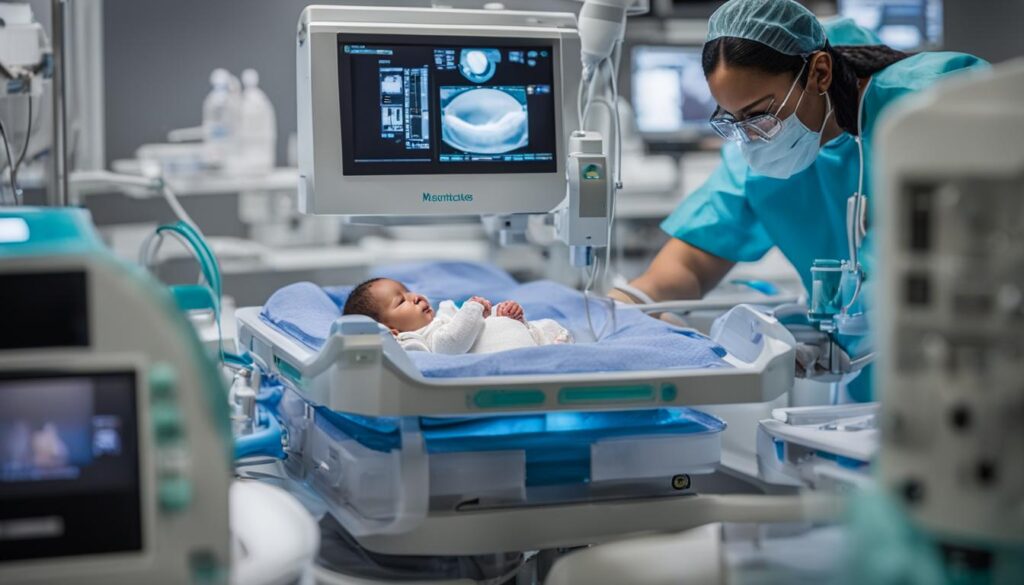In this book summary, we will explore the fascinating realm of neonatal care and the courageous medical professionals who perform life-saving miracles in the Baby ER. Edward Humes offers readers an inspiring glimpse into the emotionally-charged world of neonatal medicine. Join us as we uncover the gripping stories of tiny patients who overcome seemingly insurmountable odds with the help of dedicated doctors and nurses. Throughout this article, we will delve into the challenges, ethical considerations, and awe-inspiring breakthroughs that characterize this remarkable field of healthcare.
Introduction to Baby ER
Baby ER, written by Edward Humes, offers a captivating overview of neonatal care and the incredible medical heroes who dedicate their lives to saving the tiniest patients. In this book, Humes takes readers on a gripping journey through the world of neonatal medicine, exploring the challenges, breakthroughs, and life-saving miracles that occur in the Baby ER.
Neonatal care is a specialized area of medicine that focuses on the treatment of newborn infants, especially those who are premature, ill, or have life-threatening conditions. The doctors and nurses who work in this field are truly medical heroes, using their knowledge, skill, and dedication to make a difference in the lives of the tiniest and most vulnerable patients.
Topics Covered in Baby ER
Throughout the book, Humes covers a wide range of topics related to neonatal care:
| Topic | Description |
|---|---|
| The complexities of neonatal care | From treating premature babies to managing life-threatening conditions, neonatal care involves unique challenges that doctors and nurses encounter in the Baby ER. |
| The heroes of Baby ER | Doctors, nurses, and other medical professionals play vital roles in neonatal care. Humes celebrates their dedication and heroism in his book. |
| Life-saving miracles | Humes explores the awe-inspiring stories of life-saving miracles that occur in the Baby ER, from groundbreaking medical breakthroughs to heart-stopping interventions that define neonatal care. |
| Medical ethics | Neonatal care often involves difficult ethical decisions. Humes examines the moral complexities faced by medical professionals in the Baby ER, exploring the challenges they encounter and the principles guiding their decision-making. |
| The neonatal environment | Humes takes readers inside the Neonatal Intensive Care Unit (NICU) and explores the specialized equipment used in neonatal care, providing a glimpse into the unique setting where miracles happen. |
| The importance of family support | Family support plays a crucial role in the Baby ER. Humes discusses the significance of parental involvement, emotional support, and family-centered care in neonatal settings. |
| Advances in neonatal medicine | Humes explores the latest medical advancements, technological innovations, and ongoing research that contribute to improving outcomes in the Baby ER. |
The Challenges of Neonatal Care
Neonatal care presents unique medical challenges that require specialized attention and care. Premature babies born before 37 weeks of gestation can present complicated medical issues, including respiratory distress syndrome, apnea, bradycardia, and a greater risk for infections due to immature immune systems. Treating these tiny patients requires significant medical expertise and a multidisciplinary approach.
Life-threatening conditions such as heart defects, brain injuries, and meningitis can arise in neonates, necessitating careful diagnosis and treatment. Medical professionals must also contend with ethical dilemmas that go hand in hand with neonatal care, such as the decision to continue aggressive treatment in the face of poor outcomes, among others.
Despite these challenges, medical professionals in the Baby ER remain dedicated to providing exceptional care to their tiniest patients. They engage in ongoing education, research, and training to stay up-to-date on the latest best practices in neonatal care, and collaborate with colleagues to provide comprehensive and compassionate care.
The Heroes of Baby ER
Neonatal care is a challenging and demanding field that requires a dedicated team of medical professionals to achieve successful outcomes. The doctors, nurses, and neonatal specialists who work in the Baby ER are nothing short of heroes, tirelessly striving to give their tiny patients the best possible chance at life.
Doctors are the leaders of the neonatal team, responsible for diagnosing and treating infants with complex medical conditions. They work closely with neonatal nurses to develop comprehensive care plans that address each patient’s unique needs. Neonatal nurses play a crucial role in providing hands-on care, monitoring vital signs, administering medication, and feeding premature infants. They are often the primary source of emotional support for families during a stressful time.
Specialists in the neonatal field, such as respiratory therapists and social workers, also play a vital role in the care of premature and sick infants. Respiratory therapists help manage the respiratory needs of infants, including mechanical ventilation to support their breathing. Social workers assist parents and families with emotional and financial challenges that often arise during a NICU stay.
The Role of Doctors in Neonatal Care
Doctors in the Baby ER must possess a broad range of medical knowledge and skills. They must be familiar with every drug, device, and procedure used in neonatology to provide the best possible care to their patients. A neonatal doctor must also have excellent communication skills to effectively navigate the complexities of working with vulnerable babies and their families. They must be able to talk parents through complex medical procedures while being empathetic and supportive.
The Role of Nurses in Neonatal Care
Neonatal nurses in the Baby ER are highly skilled and specialized professionals. They perform a range of duties, from administering medication to monitoring vital signs and providing emotional support to families. Working with physicians, neonatal nurses develop care plans that address the unique needs of each patient. They are also responsible for communicating with families and other healthcare professionals about their infant’s condition and treatment plan.
The specialized expertise of neonatal nurses is invaluable when treating premature babies, as their care often requires more attention to detail, careful monitoring, and frequent interventions.
“Nurses have a profound impact on the lives of their patients. They’re often the first to identify changes in a baby’s condition, so they play a critical role in ensuring the best possible outcomes. ” – Edward Humes, Baby ER: The Heroic Doctors and Nurses Who Perform Medicine’s Tiniest Miracles
Life-Saving Miracles in the Baby ER
Neonatal care is a complex field that requires skilled professionals who possess extraordinary dedication, compassion, and expertise. The Baby ER is a place where miraculous moments happen every day, where doctors and nurses bring their best selves and work tirelessly to achieve the best possible outcomes for their tiniest patients. From innovative medical breakthroughs to heart-stopping interventions, the stories of the life-saving miracles that occur in the Baby ER are awe-inspiring.
One remarkable example of a medical breakthrough is the use of surfactant therapy to treat premature babies with respiratory distress syndrome. This therapy involves administering surfactant to the baby’s lungs through a breathing tube, which helps the lungs expand and function properly. Thanks to this groundbreaking treatment, premature babies who once faced life-threatening conditions can now breathe easier and have a greater chance of survival.
Another astonishing example of a life-saving intervention is the use of extracorporeal membrane oxygenation (ECMO). ECMO is a medical device that functions as an artificial lung and heart. It provides oxygenation and circulation support to critically ill babies whose lungs and/or heart are unable to function properly. Through this life-saving innovation, babies who once had little chance of survival can now be given a fighting chance.
“The dedicated team of medical professionals in the Baby ER work tirelessly to perform these astonishing medical breakthroughs and interventions, saving the lives of the tiniest patients. Their dedication and commitment to providing the highest quality neonatal care are a testament to the heroic efforts of these medical heroes.”
The High Cost of Medical Breakthroughs
While medical advancements can result in miraculous moments in the Baby ER, they can also come at a significant cost. The use of advanced medical equipment and technology used in neonatal care can be expensive, and not all families can afford it. This underscores the importance of providing affordable and accessible neonatal care to all families, regardless of their socioeconomic status.
The Emotional Impact of Life-Saving Interventions
Life-saving medical interventions in the Baby ER often have a profound emotional impact on families. Witnessing their tiny babies go through challenging procedures can be emotionally draining. Recognizing this emotional toll, many neonatal care facilities offer emotional support to families, empowering them through parental involvement and creating a family-centered care environment.
Navigating Ethical Dilemmas in Neonatal Care
Working in the Baby ER demands not only medical expertise but also sound moral judgment. Neonatal care presents unique challenges, where difficult ethical decisions must be made to preserve life, safeguard patient autonomy, and ensure compliance with medical regulations.
Doctors and nurses in the Baby ER face challenging choices that require careful consideration of various ethical principles. These include the principles of beneficence (doing good), non-maleficence (avoiding harm), justice (fairness in treatment), and respect for autonomy (patient self-determination).
The moral complexities encountered in neonatal care can range from deciding on the level of care for infants born prematurely to determining the appropriate course of action for terminally ill patients. These dilemmas frequently involve trade-offs between competing ethical principles and require nuanced decision-making.
“In neonatal care, ethical decisions can be emotionally taxing and intellectually challenging. It is important for medical professionals to have a deep understanding of medical ethics and the ability to apply them in complex cases.”
The Role of Medical Ethics Committees
Medical ethics committees play a critical role in neonatal care, offering guidance and support for medical professionals who encounter ethical dilemmas in their practice. These committees consist of interdisciplinary experts, including doctors, nurses, chaplains, legal experts, and patients’ representatives, helping healthcare providers navigate complex ethical challenges.
Challenges in Applying Medical Ethics in Neonatal Care
Applying medical ethics in neonatal care can be challenging because of variations in ethical values and beliefs among different cultures and individuals. Different healthcare providers may interpret ethical principles differently, leading to inconsistencies in decisions.
Additionally, medical professionals in the Baby ER often face time constraints, limited resources, and high-pressure situations where they need to make quick and effective decisions. These factors can contribute to moral distress, where healthcare providers experience psychological discomfort when they are unable to do what they believe to be the right thing.
A Glimpse into the Neonatal Environment
To truly grasp the world of neonatal care, one must understand the setting in which it takes place. The Neonatal Intensive Care Unit (NICU) is a specialized area of the hospital where premature babies and those with life-threatening conditions receive round-the-clock care from highly skilled medical professionals.
| Equipment | Description |
|---|---|
| Incubators | Enclosed cribs that regulate temperature and humidity to provide a stable environment for premature babies. |
| Ventilators | Machines that support breathing by delivering oxygen and regulating air pressure. |
| C-PAP machines | Devices that deliver a continuous flow of air to help keep airways open. |
| Cardiac monitors | Machines that track the baby’s vital signs, including heart rate, blood pressure, and oxygen levels. |
| Feeding tubes | Tubes that deliver breast milk or formula directly to the baby’s stomach. |
Specialized equipment plays a crucial role in the care of neonatal patients. The table above highlights some of the most common equipment found in the NICU. The use of this equipment requires extensive training and expertise to ensure the safety and well-being of the baby.
As you can see, the neonatal environment is a highly specialized area of medicine, requiring advanced knowledge, training, and equipment to perform the delicate and often life-saving procedures that take place within it.
The Importance of Family Support
At the Baby ER, neonatal care involves not only the medical staff but also family members who play a crucial role in the care process. Parental involvement, emotional support, and family-centered care are essential components of neonatal care that improve outcomes for both the babies and families.
Research has shown that parental involvement in the NICU, including skin-to-skin contact and participation in the care of their baby, can lead to improved health outcomes such as weight gain and shorter hospital stays. Moreover, it facilitates bonding and promotes emotional support for parents during a challenging time.
Emotional support from medical professionals, social workers, and other families in the NICU also enhances the stress adaptation of parents and promotes their resilience. Family-centered care, which focuses on the needs of the whole family, not just the baby, improves communication and decision-making processes, leading to better overall outcomes.
Ultimately, family support empowers families to be involved in their baby’s journey to recovery, which can have positive effects on their physical and mental health in the long term.
“Being a parent is not just a privilege but a responsibility, especially when your child needs you the most in the NICU.”
Advances in Neonatal Medicine
The field of neonatal care has made considerable strides with the latest medical advancements, technological innovations, and ongoing research. These developments enable medical professionals to provide more effective treatment and better outcomes in the Baby ER.
| Medical Advancements | Technological Innovations | Ongoing Research |
|---|---|---|
| Growth Hormone Therapy | In utero surgeries | Gene Therapy for genetic disorders |
| Oxygen Saturation Monitoring | Non-Invasive Ventilation | Neurological Monitoring for brain function |
| Surfactants Therapy for Respiratory Distress Syndrome | Incubators and Specialized Equipment for preemies | Stem Cell Therapy for organ dysfunction |
The use of innovative technologies, such as 3D-printing and simulation training, has also contributed to advancements in neonatal care. These tools provide healthcare professionals with the opportunity to learn, train and plan procedures in a safe and controlled environment before applying them in real-life scenarios.
Moreover, continuing research in neonatology provides invaluable insights into the medical aspects of neonatal care. Researchers focus on improving outcomes for premature babies, neonatal infections, genetic and metabolic disorders, and other conditions that affect babies in the Baby ER. These findings enhance and advance medical practice, paving the way for a brighter future for neonatal medicine.

Conclusion
Baby ER is an essential read for anyone interested in the incredible world of neonatal care. The book provides a captivating glimpse into the heroic efforts of doctors and nurses who work tirelessly to save the lives of the tiniest and most vulnerable patients.
Through the stories of medical heroes, we are reminded of the immense challenges and complexities of neonatal care. From treating premature babies to navigating ethical dilemmas, the Baby ER is a world where miracles happen every day.
Despite the difficulties they encounter, medical professionals in the Baby ER remain dedicated and committed to their patients, demonstrating unwavering empathy, and compassion. It is heartwarming to see how family support is essential in neonatal care, and parental involvement, emotional support, and family-centered care is crucial for neonates’ well-being.
The advances in neonatal medicine have significantly contributed to improving outcomes, and the ongoing research is continually refining and expanding our understanding of neonatal care.
In conclusion, Baby ER is a testament to the power of hope, resilience, and the human spirit. It celebrates the remarkable journey of the tiny heroes who overcome tremendous odds every day and inspires us all to be a part of something truly incredible.



